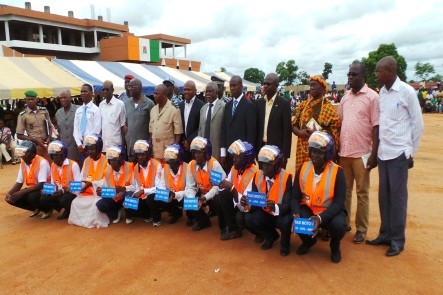
July 2014—In Bouaké, Côte d'Ivoire, there are approximately 19,000 motorcycle taxi drivers, many of whom are ex-combatants. Following the 2010-2011 post-electoral crisis, ex-rebel officers continued to manipulate their former forces, now turned “moto-taxi” drivers, by forcing them to hand over their daily taxi fares. The former rebel leaders also used their political influence to ensure moto-taxi drivers were not held accountable by state law enforcement, thus encouraging the drivers to engage in illegal activities to earn extra money.
To change this dynamic, USAID supported a workshop in February among moto-taxi drivers to raise awareness of how their reputation as criminals hurt their earning potential.
“We are accused of so many crimes in the city …. this impacts our income-earning ability,” said Souma Aboubacar, president of the Bouaké Moto-Taxis Association. He went on to identify one of the core issues: “Anyone can take a moto and pretend to be a moto-taxi driver, so we must find a way to clearly identify the real moto-taxis.”
To tackle this problem, the moto-taxis drivers created a union and formally registered their members in March 2014. With USAID support, each of the registrants was provided with a kit consisting of a branded vest and plate that formally identifies them as an official moto-taxi. A public information campaign raised awareness for passengers to easily report any criminal activity by a moto-taxi to the police. During a public ceremony at City Hall, all registered moto-taxi drivers formally committed to abide by a code of conduct and to report any criminal activities by taxi drivers.
The cooperation between moto-taxis and local authorities has led to sustained support from the Bouaké mayor, who has promised to supply official vests and plates for any moto-taxi driver who registers. The association also successfully negotiated a special reduced rate for driver’s licenses, reducing the cost from $300 to $150 per license. This has allowed over 3,000 moto-taxis to obtain an official license.
The registration process has also improved driving skills and understanding of traffic laws, while reducing the number of traffic incidents. The officially registered moto-taxis are getting more business from passengers, which incentivizes more drivers to seek official registration.
As one resident of Bouaké said, “There is no question about that—I would definitely choose to ride on a moto-taxi with vest and plate. I think that’s what everyone would do.”







Comment
Make a general inquiry or suggest an improvement.